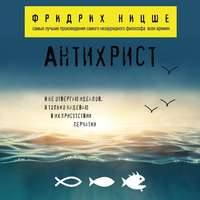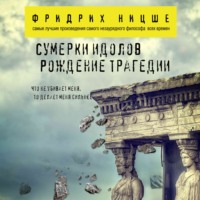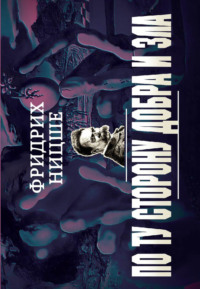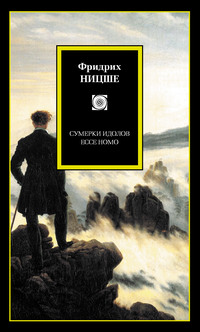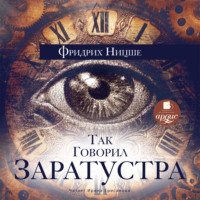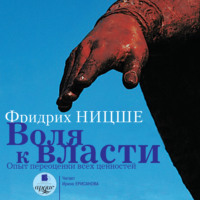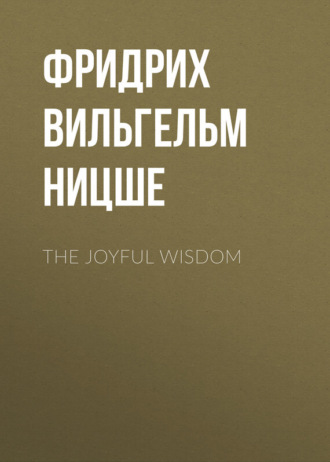 полная версия
полная версияThe Joyful Wisdom
How one has to Distinguish first of all in Works of Art —Everything that is thought, versified, painted and composed, yea, even built and moulded, belongs either to monologic art, or to art before witnesses. Under the latter there is also to be included the apparently monologic art which involves the belief in God, the whole lyric of prayer; because for a pious man there is no solitude, – we, the godless, have been the first to devise this invention. I know of no profounder distinction in all the perspective of the artist than this: Whether he looks at his growing work of art (at "himself – ") with the eye of the witness; or whether he "has forgotten the world," as is the essential thing in all monologic art, – it rests on forgetting, it is the music of forgetting.
368The Cynic Speaks. —My objections to Wagner's music are physiological objections. Why should I therefore begin by disguising them Under æsthetic formulæ? My "point" is that I can no longer breathe freely when this music begins to operate on me; my foot immediately becomes indignant at it and rebels: for what it needs is time, dance and march; it demands first of all from music the ecstasies which are in good walking, striding, leaping and dancing. But do not my stomach, my heart, my blood and my bowels also protest? Do I not become hoarse unawares under its influence? And then I ask myself what my body really wants from music generally. I believe it wants to have relief: so that all animal functions should be accelerated by means of light, bold, unfettered, self-assured rhythms; so that brazen, leaden life should be gilded by means of golden, good, tender harmonies. My melancholy would fain rest its head in the hiding-places and abysses of perfection: for this reason I need music. What do I care for the drama! What do I care for the spasms of its moral ecstasies, in which the "people" have their satisfaction! What do I care for the whole pantomimic hocus-pocus of the actor!.. It will now be divined that I am essentially anti-theatrical at heart, – but Wagner on the contrary, was essentially a man of the stage and an actor, the most enthusiastic mummer-worshipper that has ever existed, even among musicians!.. And let it be said in passing that if Wagner's theory was that "drama is the object, and music is only the means to it," – his practice on the contrary from beginning to end has been to the effect that "attitude is the object, drama and even music can never be anything else but means to this." Music as a means of elucidating, strengthening and intensifying dramatic poses and the actor's appeal to the senses, and Wagnerian drama only an opportunity for a number of dramatic attitudes! Wagner possessed, along with all other instincts, the dictatorial instinct of a great actor in all and everything, and as has been said, also as a musician. – I once made this clear with some trouble to a thorough-going Wagnerian, and I had reasons for adding: – "Do be a little more honest with yourself: we are not now in the theatre. In the theatre we are only honest in the mass; as individuals we lie, we belie even ourselves. We leave ourselves at home when we go to the theatre; we there renounce the right to our own tongue and choice, to our taste, and even to our courage as we possess it and practise it within our own four walls in relation to God and man. No one takes his finest taste in art into the theatre with him, not even the artist who works for the theatre: there one is people, public, herd, woman, Pharisee, voting animal, democrat, neighbour, and fellow-creature; there even the most personal conscience succumbs to the levelling charm of the 'great multitude'; there stupidity operates as wantonness and contagion; there the neighbour rules, there one becomes a neighbour…" (I have forgotten to mention what my enlightened Wagnerian answered to my physiological objections: "So the fact is that you are really not healthy enough for our music?" – )
369Juxtapositions in us.– Must we not acknowledge to ourselves, we artists, that there is a strange discrepancy in us; that on the one hand our taste, and on the other hand our creative power, keep apart in an extraordinary manner, continue apart, and have a separate growth; – I mean to say that they have entirely different gradations and tempi of age, youth, maturity, mellowness and rottenness? So that, for example, a musician could all his life create things which contradicted all that his ear and heart, spoilt for listening, prized, relished and preferred: – he would not even require to be aware of the contradiction! As an almost painfully regular experience shows, a person's taste can easily outgrow the taste of his power, even without the latter being thereby paralysed or checked in its productivity. The reverse, however, can also to some extent take place, – and it is to this especially that I should like to direct the attention of artists. A constant producer, a man who is a "mother" in the grand sense of the term, one who no longer knows or hears of anything except pregnancies and child-beds of his spirit, who has no time at all to reflect and make comparisons with regard to himself and his work, who is also no longer inclined to exercise his taste, but simply forgets it, letting it take its chance of standing, lying or falling, – perhaps such a man at last produces works on which he is then quite unfit to pass a judgment: so that he speaks and thinks foolishly about them and about himself. This seems to me almost the normal condition with fruitful artists, – nobody knows a child worse than its parents – and the rule applies even (to take an immense example) to the entire Greek world of poetry and art, which was never "conscious" of what it had done…
370What is Romanticism?– It will be remembered perhaps, at least among my friends, that at first I assailed the modern world with some gross errors and exaggerations, but at any rate with hope in my heart. I recognised – who knows from what personal experiences? – the philosophical pessimism of the nineteenth century as the symptom of a higher power of thought, a more daring courage and a more triumphant plenitude of life than had been characteristic of the eighteenth century, the age of Hume, Kant, Condillac, and the sensualists: so that the tragic view of things seemed to me the peculiar luxury of our culture, its most precious, noble, and dangerous mode of prodigality; but nevertheless, in view of its overflowing wealth, a justifiable luxury. In the same way I interpreted for myself German music as the expression of a Dionysian power in the German soul: I thought I heard in it the earthquake by means of which a primeval force that had been imprisoned for ages was finally finding vent – indifferent as to whether all that usually calls itself culture was thereby made to totter. It is obvious that I then misunderstood what constitutes the veritable character both of philosophical pessimism and of German music, – namely, their Romanticism. What is Romanticism? Every art and every philosophy may be regarded as a healing and helping appliance in the service of growing, struggling life: they always presuppose suffering and sufferers. But there are two kinds of sufferers: on the one hand those that suffer from overflowing vitality, who need Dionysian art, and require a tragic view and insight into life; and on the other hand those who suffer from reduced vitality, who seek repose, quietness, calm seas, and deliverance from themselves through art or knowledge, or else intoxication, spasm, bewilderment and madness. All Romanticism in art and knowledge responds to the twofold craving of the latter; to them Schopenhauer as well as Wagner responded (and responds), – to name those most celebrated and decided romanticists, who were then misunderstood by me (not however to their disadvantage, as may be reasonably conceded to me). The being richest in overflowing vitality, the Dionysian God and man, may not only allow himself the spectacle of the horrible and questionable, but even the fearful deed itself, and all the luxury of destruction, disorganisation and negation. With him evil, senselessness and ugliness seem as it were licensed, in consequence of the overflowing plenitude of procreative, fructifying power, which can convert every desert into a luxuriant orchard. Conversely, the greatest sufferer, the man poorest in vitality, would have most need of mildness, peace and kindliness in thought and action: he would need, if possible, a God who is specially the God of the sick, a "Saviour"; similarly he would have need of logic, the abstract intelligibility of existence – for logic soothes and gives confidence; – in short he would need a certain warm, fear-dispelling narrowness and imprisonment within optimistic horizons. In this manner I gradually began to understand Epicurus, the opposite of a Dionysian pessimist; – in a similar manner also the "Christian," who in fact is only a type of Epicurean, and like him essentially a romanticist: – and my vision has always become keener in tracing that most difficult and insidious of all forms of retrospective inference, in which, most mistakes have been made – the inference from the work to its author from the deed to its doer, from the ideal to him who needs it, from every mode of thinking and valuing to the imperative want behind it. – In regard to all æsthetic values I now avail myself of this radical distinction: I ask in every single case, "Has hunger or superfluity become creative here?" At the outset another distinction might seem to recommend itself more – it is far more conspicuous, – namely, to have in view whether the desire for rigidity, for perpetuation, for being is the cause of the creating, or the desire for destruction, for change, for the new, for the future – for becoming. But when looked at more carefully, both these kinds of desire prove themselves ambiguous, and are explicable precisely according to the before-mentioned, and, as it seems to me, rightly preferred scheme. The desire for destruction, change and becoming, may be the expression of overflowing power, pregnant with futurity (my terminus for this is of course the word "Dionysian"); but it may also be the hatred of the ill-constituted, destitute and unfortunate, which destroys, and must destroy, because the enduring, yea, all that endures, in fact all being, excites and provokes it. To understand this emotion we have but to look closely at our anarchists. The will to perpetuation requires equally a double interpretation. It may on the one hand proceed from gratitude and love: – art of this origin will always be an art of apotheosis, perhaps dithyrambic, as with Rubens, mocking divinely, as with Hafiz, or clear and kind-hearted as with Goethe, and spreading a Homeric brightness and glory over everything (in this case I speak of Apollonian art). It may also, however, be the tyrannical will of a sorely-suffering, struggling or tortured being, who would like to stamp his most personal, individual and narrow characteristics, the very idiosyncrasy of his suffering, as an obligatory law and constraint on others; who, as it were, takes revenge on all things, in that he imprints, enforces and brands his image, the image of his torture, upon them. The latter is romantic pessimism in its most extreme form, whether it be as Schopenhauerian will-philosophy, or as Wagnerian music: – romantic pessimism, the last great event in the destiny of our civilisation. (That there may be quite a different kind of pessimism, a classical pessimism – this presentiment and vision belongs to me, as something inseparable from me, as my proprium and ipsissimum; only that the word "classical" is repugnant to my ears, it has become far too worn, too indefinite and indistinguishable. I call that pessimism of the future, – for it is coming! I see it coming! —Dionysian pessimism.)
371We Unintelligible Ones.– Have we ever complained among ourselves of being misunderstood, misjudged, and confounded with others; of being calumniated, misheard, and not heard? That is just our lot – alas, for a long time yet! say, to be modest, until 1901 – , it is also our distinction; we should not have sufficient respect for ourselves if we wished it otherwise. People confound us with others – the reason of it is that we ourselves grow, we change continually, we cast off old bark, we still slough every spring, we always become younger, higher, stronger, as men of the future, we thrust our roots always more powerfully into the deep – into evil – , while at the same time we embrace the heavens ever more lovingly, more extensively, and suck in their light ever more eagerly with all our branches and leaves. We grow like trees – that is difficult to understand, like all life! – not in one place, but everywhere, not in one direction only, but upwards and outwards, as well as inwards and downwards. At the same time our force shoots forth in stem, branches, and roots; we are really no longer free to do anything separately, or to be anything separately… Such is our lot, as we have said: we grow in height; and even should it be our calamity – for we dwell ever closer to the lightning! – well, we honour it none the less on that account; it is that which we do not wish to share with others, which we do not wish to bestow upon others, the fate of all elevation, our fate…
372Why we are not Idealists. —Formerly philosophers were afraid of the senses: have we, perhaps, been far too forgetful of this fear? We are at present all of us sensualists, we representatives of the present and of the future in philosophy, —not according to theory, however, but in praxis, in practice… Those former philosophers, on the contrary, thought that the senses lured them out of their world, the cold realm of "ideas," to a dangerous southern island, where they were afraid that their philosopher-virtues would melt away like snow in the sun. "Wax in the ears," was then almost a condition of philosophising; a genuine philosopher no longer listened to life, in so far as life is music, he denied the music of life – it is an old philosophical superstition that all music is Sirens' music. – Now we should be inclined at the present day to judge precisely in the opposite manner (which in itself might be just as false), and to regard ideas, with their cold, anæmic appearance, and not even in spite of this appearance, as worse seducers than the senses. They have always lived on the "blood" of the philosopher, they always consumed his senses, and indeed, if you will believe me, his "heart" as well. Those old philosophers were heartless: philosophising was always a species of vampirism. At the sight of such figures even as Spinoza, do you not feel a profoundly enigmatical and disquieting sort of impression? Do you not see the drama which is here performed, the constantly increasing pallor– , the spiritualisation always more ideally displayed? Do you not imagine some long-concealed blood-sucker in the background, which makes its beginning with the senses, and in the end retains or leaves behind nothing but bones and their rattling? – I mean categories, formulæ, and words(for you will pardon me in saying that what remains of Spinoza, amor intellectualis dei, is rattling and nothing more! What is amor, what is deus, when they have lost every drop of blood?..) In summa: all philosophical idealism has hitherto been something like a disease, where it has not been, as in the case of Plato, the prudence of superabundant and dangerous healthfulness, the fear of overpowerful senses, and the wisdom of a wise Socratic. – Perhaps, is it the case that we moderns are merely not sufficiently sound to require Plato's idealism? And we do not fear the senses because —
373"Science" as Prejudice. – It follows from the laws of class distinction that the learned, in so far as they belong to the intellectual middle-class, are debarred from getting even a sight of the really great problems and notes of interrogation. Besides, their courage, and similarly their outlook, does not reach so far, – and above all, their need, which makes them investigators, their innate anticipation and desire that things should be constituted in such and such a way, their fears and hopes are too soon quieted and set at rest. For example, that which makes the pedantic Englishman, Herbert Spencer, so enthusiastic in his way, and impels him to draw a line of hope, a horizon of desirability, the final reconciliation of "egoism and altruism" of which he dreams, – that almost causes nausea to people like us: – a humanity with such Spencerian perspectives as ultimate perspectives would seem to us deserving of contempt, of extermination! But the fact that something has to be taken by him as his highest hope, which is regarded, and may well be regarded, by others merely as a distasteful possibility, is a note of interrogation which Spencer could not have foreseen… It is just the same with the belief with which at present so many materialistic natural-scientists are content, the belief in a world which is supposed to have its equivalent and measure in human thinking and human valuations, a "world of truth" at which we might be able ultimately to arrive with the help of our insignificant, four-cornered human reason! What? do we actually wish to have existence debased in that fashion to a ready-reckoner exercise and calculation for stay-at-home mathematicians? We should not, above all, seek to divest existence of its ambiguous character: good taste forbids it, gentlemen, the taste of reverence for everything that goes beyond your horizon! That a world-interpretation is alone right by which you maintain your position, by which investigation and work can go on scientifically in your sense (you really mean mechanically?), an interpretation which acknowledges numbering, calculating, weighing, seeing and handling, and nothing more – such an idea is a piece of grossness and naïvety, provided it is not lunacy and idiocy. Would the reverse not be quite probable, that the most superficial and external characters of existence – its most apparent quality, its outside, its embodiment – should let themselves be apprehended first? perhaps alone allow themselves to be apprehended? A "scientific" interpretation of the world as you understand it might consequently still be one of the stupidest, that is to say, the most destitute of significance, of all possible world-interpretations – I say this in confidence to my friends the Mechanicians, who to-day like to hobnob with philosophers, and absolutely believe that mechanics is the teaching of the first and last laws upon which, as upon a ground-floor, all existence must be built. But an essentially mechanical world would be an essentially meaningless world! Supposing we valued the worth of a music with reference to how much it could be counted, calculated, or formulated – how absurd such a "scientific" estimate of music would be! What would one have apprehended, understood, or discerned in it! Nothing, absolutely nothing of what is really "music" in it!..
374Our new "Infinite"– How far the perspective character of existence extends, or whether it have any other character at all, whether an existence without explanation, without "sense" does not just become "nonsense," whether, on the other hand, all existence is not essentially an explaining existence – these questions, as is right and proper, cannot be determined even by the most diligent and severely conscientious analysis and self-examination of the intellect, because in this analysis the human intellect cannot avoid seeing itself in its perspective forms, and only in them. We cannot see round our corner: it is hopeless curiosity to want to know what other modes of intellect and perspective there might be: for example, whether any kind of being could perceive time backwards, or alternately forwards and backwards (by which another direction of life and another conception of cause and effect would be given). But I think that we are to-day at least far from the ludicrous immodesty of decreeing from our nook that there can only be legitimate perspectives from that nook. The world, on the contrary, has once more become "infinite" to us: in so far we cannot dismiss the possibility that it contains infinite interpretations. Once more the great horror seizes us – but who would desire forthwith to deify once more this monster of an unknown world in the old fashion? And perhaps worship the unknown thing as the "unknown person" in future? Ah! there are too many ungodly possibilities of interpretation comprised in this unknown, too much devilment, stupidity and folly of interpretation, – our own human, all too human interpretation itself, which we know…
375Why we Seem to be Epicureans.– We are cautious, we modern men, with regard to final convictions, our distrust lies in wait for the enchantments and tricks of conscience involved in every strong belief, in every absolute Yea and Nay: how is this explained? Perhaps one may see in it a good deal of the caution of the "burnt child," of the disillusioned idealist; but one may also see in it another and better element, the joyful curiosity of a former lingerer in a corner, who has been brought to despair by his nook, and now luxuriates and revels in its antithesis, in the unbounded, in the "open air in itself." Thus there is developed an almost Epicurean inclination for knowledge, which does not readily lose sight of the questionable character of things; likewise also a repugnance to pompous moral phrases and attitudes, a taste that repudiates all coarse, square contrasts, and is proudly conscious of its habitual reserve. For this too constitutes our pride, this easy tightening of the reins in our headlong impulse after certainty, this self-control of the rider in his most furious riding: for now, as of old, we have mad, fiery steeds under us, and if we delay, it is certainly least of all the danger which causes us to delay…
376Our Slow Periods.– It is thus that artists feel, and all men of "works," the maternal species of men: they always believe at every chapter of their life – a work always makes a chapter – that they have now reached the goal itself; they would always patiently accept death with the feeling: "we are ripe for it." This is not the expression of exhaustion, – but rather that of a certain autumnal sunniness and mildness, which the work itself, the maturing of the work, always leaves behind in its originator. Then the tempo of life slows down – turns thick and flows with honey – into long pauses, into the belief in the long pause…
377We Homeless Ones. —Among the Europeans of to-day there are not lacking those who may call themselves homeless ones in a way which is at once a distinction and an honour; it is by them that my secret wisdom and gaya scienza is especially to be laid to heart! For their lot is hard, their hope uncertain; it is a clever feat to devise consolation for them. But what good does it do! We children of the future, how could we be at home in the present? We are unfavourable to all ideals which could make us feel at home in this frail, broken-down, transition period; and as regards the "realities" thereof, we do not believe in their endurance. The ice which still carries has become very thin: the thawing wind blows; we ourselves, the homeless ones, are an agency that breaks the ice, and the other too thin "realities."… We "preserve" nothing, nor would we return to any past age; we are not at all "liberal," we do not labour for "progress," we do not need first to stop our ears to the song of the market-place and the sirens of the future – their song of "equal rights," "free society," "no longer either lords or slaves," does not allure us! We do not by any means think it desirable that the kingdom of righteousness and peace should be established on earth (because under any circumstances it would be the kingdom of the profoundest mediocrity and Chinaism); we rejoice in all men, who like ourselves love danger, war and adventure, who do not make compromises, nor let themselves be captured, conciliated and stunted; we count ourselves among the conquerors; we ponder over the need of a new order of things, even of a new slavery – for every strengthening and elevation of the type "man" also involves a new form of slavery. Is it not obvious that with all this we must feel ill at ease in an age which claims the honour of being the most humane, gentle and just that the sun has ever seen? What a pity that at the mere mention of these fine words, the thoughts at the bottom of our hearts are all the more unpleasant, that we see therein only the expression – or the masquerade – of profound weakening, exhaustion, age, and declining power! What can it matter to us with what kind of tinsel an invalid decks out his weakness? He may parade it as his virtue; there is no doubt whatever that weakness makes people gentle, alas, so gentle, so just, so inoffensive, so "humane"! – The "religion of pity," to which people would like to persuade us – yes, we know sufficiently well the hysterical little men and women who need this religion at present as a cloak and adornment! We are no humanitarians; we should not dare to speak of our "love of mankind"; for that, a person of our stamp is not enough of an actor! Or not sufficiently Saint-Simonist, not sufficiently French. A person must have been affected with a Gallic excess of erotic susceptibility and amorous impatience even to approach mankind honourably with his lewdness… Mankind! Was there ever a more hideous old woman among all old women (unless perhaps it were "the Truth": a question for philosophers)? No, we do not love Mankind! On the other hand, however, we are not nearly "German" enough (in the sense in which the word "German" is current at present) to advocate nationalism and race-hatred, or take delight in the national heart-itch and blood-poisoning, on account of which the nations of Europe are at present bounded off and secluded from one another as if by quarantines. We are too unprejudiced for that, too perverse, too fastidious; also too well-informed, and too much "travelled." We prefer much rather to live on mountains, apart and "out of season," in past or coming centuries, in order merely to spare ourselves the silent rage to which we know we should be condemned as witnesses of a system of politics which makes the German nation barren by making it vain, and which is a petty system besides: – will it not be necessary for this system to plant itself between two mortal hatreds, lest its own creation should immediately collapse? Will it not be obliged to desire the perpetuation of the petty-state system of Europe?.. We homeless ones are too diverse and mixed in race and descent for "modern men," and are consequently little tempted to participate in the falsified racial self-admiration and lewdness which at present display themselves in Germany, as signs of German sentiment, and which strike one as doubly false and unbecoming in the people with the "historical sense." We are, in a word – and it shall be our word of honour! —good Europeans, the heirs of Europe, the rich, over-wealthy heirs, but too deeply obligated heirs of millenniums of European thought. As such, we have also outgrown Christianity, and are disinclined to it – and just because we have grown out of it, because our forefathers were Christians uncompromising in their Christian integrity, who willingly sacrificed possessions and positions, blood and country, for the sake of their belief. We – do the same. For what, then? For our unbelief? For all sorts of unbelief? Nay, you know better than that, my friends! The hidden Yea in you is stronger than all the Nays and Perhapses, of which you and your age are sick; and when you are obliged to put out to sea, you emigrants, it is – once more a faith which urges you thereto!..



